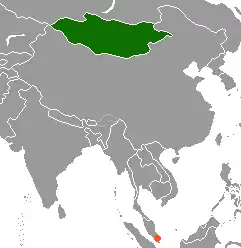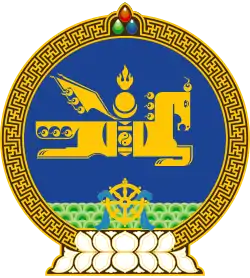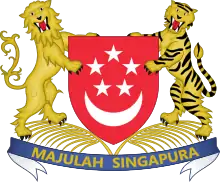Mongolia–Singapore relations
Mongolia–Singapore relations refer to the relations between Mongolia and the Republic of Singapore. The earliest contact between the two countries started in 1950, while both countries established diplomatic relations in 1970.
 | |
Mongolia |
Singapore |
|---|---|
History
Although there is a reference to "the craftsmen of the Lion City" ("Арслан хотын урчуудаараа хийлгэсэн юмаа хө""Arslan hotyn urchuudaaraa hiilgesen yumaa hu") in Aduuchin (Адуучин "Horseman"), a Mongolian folk song (origin unknown),[1] the earliest documented contact between Singapore and Mongolia started in 1950, when nine Mongolian pilgrims arrived at Singapore in a ship called the Automedon from Jeddah.[2] In 1960s, the trade between Singapore and Mongolia was restricted due to the anti-communist policies of Singapore.[3]
Singapore and Mongolia established diplomatic relations on June 11, 1970.[4] Tsevengombyn Demiddagva, the Ambassador of Mongolia to India, was appointed as the first non-resident Ambassador of Mongolia to Singapore two years later.[5] In 1990, B. Sharavsambuu, the Vice Chairman of the Councils of Minister of Mongolia, visited Singapore, marking the first official contact between the two countries.[4] In 1992, Mongolia set up a trade representative office in Singapore; an official representative, Gombojav, was resident in Singapore during the late-1990s. A consulate-general was set up in Singapore ten years later, under Resolution No.92 of the Parliament of Mongolia in 2001, whereby the Trade Representative Office of Mongolia was reorganized as a Consulate General. In 2008, the consulate-general became an embassy and Purevjav Gansukh became the first resident ambassador of Mongolia to Singapore.[4]
In 1995, Puntsagiin Jasrai, the Prime Minister of Mongolia, visited Singapore, the first Prime Minister of Mongolia to do so.[4] Further Prime Ministerial visits were by Nambaryn Enkhbayar in October 2002,[6] then-Prime Minister Ts.Elbegdorj in 2005,[7] and S.Batbold in 2011.[8] In 2001, Natsagiin Bagabandi was the first President of Mongolia to visit Singapore.[4] The President of Mongolia, Tsakhiagiin Elbegdorj, made a state visit to Singapore in November 2013. [9]
In December 1994, the Government of the Republic of Singapore accredited its Ambassador to the Republic of Korea as a non-Resident Ambassador to Mongolia. The Ambassador of the Republic of Singapore, Pang Eng Fong, presented his Letter of Credence to the Mongolian President in May 1995. [10] [11] BG Michael Teo Eng Cheng was appointed the non-resident Ambassador of Singapore to Mongolia from 1997 until 2001, [12] followed by Calvin Eu Mun Hoo in July 2002, [13] Chua Thai Keong from 2006 to 2010, Peter Tan Hai Chuan in June 2011 [14] and Yip Wei Kiat on 7 July 2015. The current non-resident Ambassador of Singapore to Mongolia is Eric Teo Boon Hee (from November 2019). [15]
In 2016, Lee Hsien Loong, the Prime Minister of Singapore visited Mongolia and became the first Prime Minister of Singapore to do so.[16] When he was welcomed by his Mongolian counterpart Jargaltulgyn Erdenebat, PM Lee stated that he would open new areas of cooperation between the two countries and enhance bilateral cooperation.[17] Both leaders of the two countries agreed the visit "opened a new chapter" for bilateral relations between the two countries.[17]
Trade relations
According to the data from The Observatory of Economic Complexity, the exported values from Singapore to Mongolia were between 10 and 20 million US dollars. The exported value started increasing in 2003, reaching a peak of 70 million US dollars in 2013, before falling between 2009 and 2012.[18] Singapore's main export product to Mongolia was motors. The proportion of food in exported products from Singapore to Mongolia started increasing in 2002.[18]
The exported values from Mongolia to Singapore were below 2 million US dollars between 1995 and 2003, in 2005, and between 2007 and 2012.[19] In 2004, gold was exported to Singapore, making a high of the exported value, at 20 million US dollars. The exported value increased again in 2012 with a rise in the export proportion of transportation utilities and motors.[19]
Singapore and Mongolia signed agreements among air services, promotion and reciprocal protection of investments and avoidance of double taxation in 1993, 1995 and 2003, separately.[4] Mongolia provided 14-day visa-free access to Singapore passport holders, while Singapore provides 30-day visa-free access to Mongolian passport holders.[20] During his visit to Mongolia in 2016, Lee Hsien Loong, the Prime Minister of Singapore, suggested the Mongolian government extend visa-free access to Mongolia for Singapore passport holders up to 30 days.[20] This was granted effective June 2017. [21]
On November 25, 2015, the Embassy of Mongolia in Singapore organized "Mongolia – Singapore Midas Touch Xchange Business Forum 2015" at The Fullerton Hotel Singapore to celebrate the 45th anniversary of the establishment of diplomatic relations between Mongolia and Singapore and the 91st anniversary of the implementation of the first Mongolian constitution and the Declaration of Independence of Mongolia.[22]
Cultural relations
As of 2013, 1000 Mongolian officials have participated in Singapore Cooperation Programme[23] in various fields such as English language, information technology, finance and management, urban and environmental management and tourism etc.[4] In 2009, the Temasek Foundation of Singapore set aside 364,000 US dollars for cooperation with the Nanyang Polytechnic of Singapore and the National Productivity and Development Centre of Mongolia to provide training programmes for 90 Mongolian officials, specialists from the government, non-governmental institutions and private enterprises.[4] Singapore also provided training programmes and study visits to Mongolian officials in public housing, Central Provident Fund system and technical and vocational education. Singapore and Mongolia signed a memorandum in energy cooperation in 2016.[17]
To commemorate 50 years of diplomatic relations between Singapore and Mongolia, SingPost and Mongol Post launched a joint stamp issue in November 2020. [24] Previous philatelic relations occurred in 1994, when Mongol Post issued stamps for the International Stamp Exhibition held in Singapore. [25]
Around 250 Mongolians live in Singapore; 7,196 Mongolians visited Singapore in 2017-2018. [26] Around 20 Singaporeans live in Mongolia;[27] 4,804 Singaporeans visited Mongolia in 2017-2018. [28] A Singaporean living in Mongolia established a non-governmental organization in order to improve Mongolians' lives.[29]
References
- "Dolgormaa-Aduuchin (Адуучин Монгол Ардын Дуу)". Be One Entertainment YouTube. 2013-02-18. Retrieved 2020-04-28.
- "222 Pilgrims Arrive". The Straits Times. 1950-11-21. Retrieved 2016-07-19.
- "Licensing law over goods from 11 nations". The Straits Times. 1969-05-26. Retrieved 2016-07-19.
- "Mongolia-Singapore Relations". Embassy of Mongolia in Singapore. Retrieved 2016-07-19.
- "First Mongolia Ambassador". The Straits Times. 1972-02-05. Retrieved 2016-07-20.
- "Speech by PM Goh Chok Tong". Ministry of Foreign Affairs Singapore. 2002-10-10. Retrieved 2020-12-18.
- "Mongolian Prime Minister Visits APEC Secretariat". APEC. 2005-04-26. Retrieved 2020-12-18.
- "Official Visit by Prime Minister of Mongolia Sukhbaatar Batbold". Ministry of Foreign Affairs Singapore. 2011-02-17. Retrieved 2020-12-18.
- "Mongolian President in Singapore on state visit". The Straits Times. 2013-11-26. Retrieved 2020-04-28.
- "Overview of Mongolia-Singapore diplomatic relations". Montsame News Agency. 2020-04-23. Retrieved 2020-04-28.
- "Faculty Profile:PANG Eng Fong". Singapore Management University. 2013-09-16. Retrieved 2020-04-28.
- "BG Teo appointed envoy to Mongolia". The Straits Times. 1997-04-02.
- "MINISTRY OF FOREIGN AFFAIRS PRESS STATEMENT". MFA in National Archives of Singapore. 2002-07-22.
- "MFA Press Statement: Appointment of Singapore's Ambassador to Mongolia". Ministry of Foreign Affairs, Singapore. 2011-05-06. Retrieved 2020-04-28.
- "Non-resident Ambassadors present letter of credence". Montsame news agency. 2019-07-11. Retrieved 2020-04-28.
- "李总理明起访问蒙古国". 聯合早報. 2016-07-12. Retrieved 2016-07-19.
- "李显龙与蒙古国总统会晤 见证能源合作备忘录签署". 海外網. 2016-07-15. Retrieved 2016-07-19.
- Alexander Simoes. "What does Singapore export to Mongolia? (1995-2014)". Observatory of Economic Complexity. Retrieved 2016-05-19.
- Alexander Simoes. "What does Mongolia export to Singapore? (1995-2014)". Observatory of Economic Complexity. Retrieved 2016-05-19.
- "国人到蒙古免签证期有望延伸". 聯合早報. 2016-07-14. Retrieved 2016-07-19.
- "Singaporeans can now travel visa-free to Mongolia for 30 days". Channel News Asia. 2017-06-08. Retrieved 2020-04-28.
- "MONGOLIA AND SINGAPORE CELEBRATES THE 45TH ANNIVERSARY OF DIPLOMATIC RELATIONS". Монгол улсын Гадаад Хэргийн Яам. Archived from the original on 2016-07-19. Retrieved 2016-07-19.
- "TOAST SPEECH BY PRESIDENT TONY TAN KENG YAM AT THE STATE BANQUET HOSTED IN HONOUR OF HIS EXCELLENCY TSAKHIA ELBEGDORJ, PRESIDENT OF MONGOLIA, 25 NOVEMBER 2013". The Istana. Archived from the original on 24 December 2016. Retrieved 2016-07-19.
- "SingPost commemorates 50 Years of Singapore-Mongolia diplomatic relations with joint stamp issue". Singapore Post. Retrieved 2020-12-18.
- "International Stamp Exhibition Singapore-94". Mongol Shuudan. Retrieved 2020-12-18.
- "Hudaldaa, Ediin zasgiin hariltsaa (Trade and Political Relations)". The Mongolian Embassy in Singapore. Retrieved 2020-12-18.
- "PM Lee: Singapore, Mongolia share perspectives as countries with bigger neighbours". The Straits Times. Retrieved 18 December 2020.
- "Hudaldaa, Ediin zasgiin hariltsaa (Trade and Political Relations)". The Mongolian Embassy in Singapore. Retrieved 2020-12-18.
- "李总理: 与蒙古政府合作 探讨让国人更方便往来". 聯合早報. 2016-07-14. Retrieved 2016-07-19.

